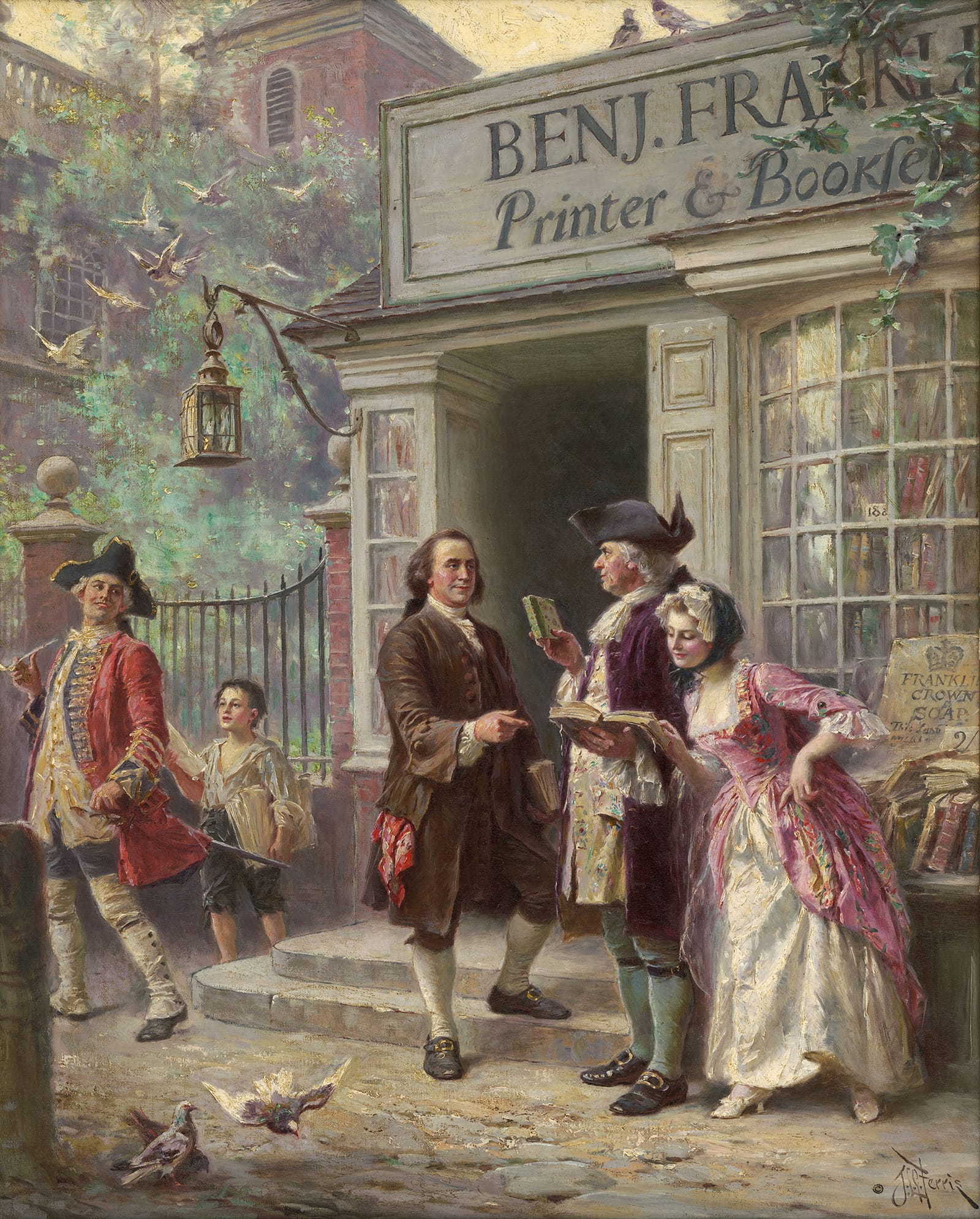A Father’s Agony: The Loss of Young Francis
Deep in the annals of American history lies a tragedy that pierced the heart of one of its most renowned figures—Benjamin Franklin. Before he became the celebrated statesman and scientist we know today, Franklin endured a devastating loss that forever shaped his life: the death of his beloved son, Francis Folger Franklin.
Born in 1732, little Francis was the apple of his father’s eye. One can only imagine the hopes and dreams Franklin held for his young son. Tragically, fate had other plans. In 1736, when the shadow of smallpox loomed large, four-year-old Francis succumbed to the disease.
The loss was utterly devastating for Franklin. The pain of losing a child, the second-guessing, the haunting “what ifs” – these were burdens he would carry for the rest of his days. At the time, inoculation against smallpox was a controversial practice, and Franklin himself had harbored doubts about its safety and efficacy. The death of his son, however, forced him to confront the stark reality of the disease and the potential of inoculation to save lives.
Overcome with grief and remorse, Franklin did something unusual for the 18th century: he publicly acknowledged his sorrow. In his newspaper, The Pennsylvania Gazette, he wrote a poignant notice expressing his deep regret for not having young Francis inoculated. This public display of vulnerability from such a prominent figure revealed the depth of his love for his son and the heavy burden of guilt he carried.
A Catalyst for Change: From Grief to Advocacy
The loss of Francis had a profound and lasting impact on Benjamin Franklin’s life and work. He would go on to become a passionate advocate for inoculation, using his influence to promote this life-saving practice. It is highly likely that his personal tragedy fueled his determination to fight preventable diseases, contributing significantly to the eventual eradication of smallpox and the advancements in vaccination we benefit from today.
But the story of Francis Folger Franklin is more than just a footnote in his father’s life. It serves as a potent reminder of the power of personal experience to shape the course of history and the enduring impact of a parent’s love.
Unraveling the Mystery: What Happened to Francis Folger Franklin?
The death of a child is a parent’s worst nightmare, and Benjamin Franklin was sadly not immune to this harsh reality. His son, Francis, born in 1732, was a bright and cheerful child who brought immense joy to his father. But this joy was tragically cut short. At only four years old, little Francis succumbed to smallpox, a disease that was a terrifyingly common cause of death in the 18th century.
This devastating loss had a profound impact on Benjamin Franklin. He was, by all accounts, completely heartbroken. The pain of losing his son so young stayed with him, shaping his views on life, science, and the importance of public health.
It is believed that Francis’s death might have been preventable. At the time, inoculation—a precursor to vaccination—was a controversial topic. Some believed it was effective, while others feared its potential risks. While Franklin had initially been hesitant about inoculation, he later became a staunch advocate, likely driven by the immense regret he felt over not inoculating his son.
This suggests that Francis’s death may have played a crucial role in shaping Franklin’s views on inoculation and his subsequent efforts to promote this important medical advancement. While we can’t know for certain what would have happened had Francis lived, his story serves as a stark reminder of the terrible toll that preventable diseases can take and the importance of continued progress in medicine and public health.
A Legacy Cut Short: What Became of Franklin’s Son?
Imagine being one of the most influential figures in American history, yet powerless to save your own child. This was Franklin’s reality when his four-year-old son, Francis Folger Franklin, died from smallpox in 1736. This event shook Franklin to his core and changed the course of his life.
Francis wasn’t just any son; he was born on October 20, 1732, the legitimate heir to Franklin’s legacy. Back then, smallpox was a terrifying disease with limited treatment options. Like many parents at the time, Franklin had reservations about inoculation, a new and somewhat controversial preventative measure. Tragically, Francis contracted smallpox and passed away on November 21, 1736. Franklin was devastated, blaming himself for not taking steps to protect his son.
While people often hid their emotions in the 18th century, Franklin publicly expressed his grief. He even wrote a heart-wrenching notice in The Pennsylvania Gazette, sharing his sorrow and regret with the world. This public display of vulnerability showed just how deeply Francis’s death had affected him.
The experience also ignited a fire in Franklin. He became a passionate advocate for inoculation, believing it could have saved his son’s life. Facing skepticism and resistance, Franklin remained persistent, recognizing the potential of inoculation to prevent countless deaths. His tireless efforts played a role in the eventual eradication of smallpox, a testament to the power of his conviction.
The loss of young Francis cast a long shadow over Franklin’s life. It fueled his drive to improve public health and advance scientific knowledge. Even today, Francis’s story serves as a stark reminder of the importance of preventive medicine. It highlights how even in the face of great personal tragedy, one person’s dedication can change the world for the better.
A Family Legacy: Are the Folgers Related to Ben Franklin?
While Ben Franklin and the Folgers who started the coffee empire aren’t directly related, there is a connection. Ben Franklin’s mother was Abiah Folger, making her the link between Franklin and this prominent family.
Sadly, the name Folger in Ben Franklin’s life also comes with a tragic story. His son, Francis Folger Franklin, unfortunately, died from smallpox at just four years old. This event was a defining moment for Franklin, pushing him to champion smallpox inoculation and highlighting the lasting impact his son, though gone too soon, had on his life.
The greater Folger family were influential figures in early America. Ben’s grandfather, Peter Folger, was known for advocating for religious freedom—a revolutionary idea at the time. This spirit of challenging the norm and promoting independent thinking seems to have run in the family, leaving a lasting legacy on American history.
Have you heard of the flying joro spider, an invasive species that has been spreading rapidly across the southeastern United States? This captivating arachnid, known for its vibrant yellow and blue markings, has become a common sight in many areas. And if you’re interested in learning more about unique adaptations, head over to fona herzogae, a fascinating species of blind cave fish that has evolved remarkable survival mechanisms in the darkness of underground environments.












